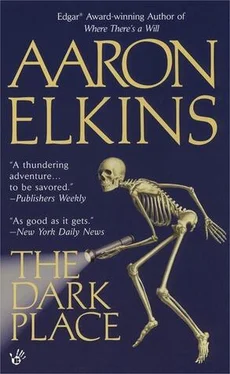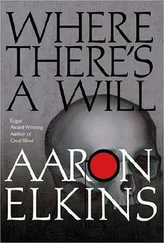Aaron Elkins - The Dark Place
Здесь есть возможность читать онлайн «Aaron Elkins - The Dark Place» весь текст электронной книги совершенно бесплатно (целиком полную версию без сокращений). В некоторых случаях можно слушать аудио, скачать через торрент в формате fb2 и присутствует краткое содержание. Жанр: Классический детектив, на английском языке. Описание произведения, (предисловие) а так же отзывы посетителей доступны на портале библиотеки ЛибКат.
- Название:The Dark Place
- Автор:
- Жанр:
- Год:неизвестен
- ISBN:нет данных
- Рейтинг книги:4 / 5. Голосов: 1
-
Избранное:Добавить в избранное
- Отзывы:
-
Ваша оценка:
- 80
- 1
- 2
- 3
- 4
- 5
The Dark Place: краткое содержание, описание и аннотация
Предлагаем к чтению аннотацию, описание, краткое содержание или предисловие (зависит от того, что написал сам автор книги «The Dark Place»). Если вы не нашли необходимую информацию о книге — напишите в комментариях, мы постараемся отыскать её.
The Dark Place — читать онлайн бесплатно полную книгу (весь текст) целиком
Ниже представлен текст книги, разбитый по страницам. Система сохранения места последней прочитанной страницы, позволяет с удобством читать онлайн бесплатно книгу «The Dark Place», без необходимости каждый раз заново искать на чём Вы остановились. Поставьте закладку, и сможете в любой момент перейти на страницу, на которой закончили чтение.
Интервал:
Закладка:
"I don’t recall," Gideon said, "that such pedestrian considerations ever caused you any concern before."
Abe slapped the table with his hand. "Right you are. You’re absolutely right. I think we got something here."
He pointed suddenly at another book. "Hand me that, will you?"
As Gideon did so, he saw that it was Yahi Archery by Saxton Pope.
Abe flicked rapidly away. Halfway through, he stopped and stared. "This settles it."
On page 119, in neat, economical lines, was a drawing of a Yahi point. It was an arrow, not a spear, and it looked like stone, not bone, but the shape and the technique of manufacture were unmistakably the same as the ones in Pringle’s collection, the one the Zanders had found, and the one in Norris Eckert’s seventh thoracic vertebra.
"That settles it," Gideon agreed. He drew a deep breath. "The Yahi." They were both quiet for a while, lost in their own thoughts. Then Gideon spoke. "Abe, something’s wrong. The Yahi were never a vicious people, and everybody who wrote about Ishi was struck by what a gentle, kind person he was. And Pringle’s story suggests the ones he saw weren’t exactly ferocious. But the ones in there now-they’ve murdered at least three people, probably more-all harmless campers or hikers. One was a young girl-"
"Listen, Gideon, in the 1850s they weren’t exactly angels. Believe me," he said, as if he’d been there, "all the atrocities weren’t on one side. Besides, who knows what their minds are like? A hundred years of isolation, of fear, of hate. Who can tell what goes on in their heads?"
"Abe," Gideon said suddenly, "I’d like to borrow these books, at least the ones that deal with the Yahi, if that’s all right with you."
"You mean tonight? What’s the hurry? You got till next spring."
"No. The FBI will want to find them long before that. I think the best thing would be for me to tell John Lau what we know, and then go in with them, or maybe a little before, to sort of smooth the way, open communication, that kind of thing…" He waved his hand uncertainly.
"Sure, that kind of thing," Abe said, imitating the vague gesture. "You sure you know what you want to do?"
"No."
Abe chewed the inside of his cheek. He pointed at his glass of tea. "I don’t want any more of this stuff. I want some Wild Turkey. A double. You, too. You know where it is?"
When Gideon returned with the bourbons they clinked glasses in a silent toast.
"What a thing," Abe said.
"What a thing," said Gideon.
"All right," Abe said, businesslike. "Let’s think about what’s going to happen after you find them. You and the FBI."
"I’ve been thinking. I can’t believe the government would want to put them in prison. And they can’t just let them stay out in the rain forest, obviously. For one thing, they’re dangerous, and for another, it would be inhumane to leave them in that climate. I think it would be good if you started talking to some of your contacts in the Bureau of Indian Affairs. Maybe it’s possible to get them some small piece of land of their own, off in a wilderness area."
"A reservation? Gideon, you take primitive people from their own land, no matter how hot, or cold, or wet, or dry, and put them someplace else, even with all the modern conveniences, and they wither away. You know that."
"Yes, I know that, but they’re already withering. And what’s the alternative? Lock them up in some big concrete building? They’d die for sure. This way we might be able to save them. Not just the people, but what’s left of the culture."
"Maybe," Abe said doubtfully. "All right, I’ll talk to the BIA, but I don’t know. Maybe it takes an Act of Congress to create a reservation. And this would be a pretty funny reservation. You couldn’t let them leave it."
"It’s a pretty funny situation." Gideon looked at his watch. "Eleven-thirty. It’s been a full day, Abe. I’m going to be getting along."
"Finish your bourbon. You can’t waste Wild Turkey."
They touched glasses one more time. "Here’s to Ishi," Abe said.
"And the Yahi."
They drained their glasses.
It was midnight when Gideon got back to the cottage, but his mind was too active for sleep. He turned on the small electric wall heater against the damp chill that had been building up during the past few days, pulled on an old woolen sweater, and sat down at the little Formica table with Abe’s books spread out in front of him. In a few seconds he was up again, hunting for the tea kettle. He had been the kind of child who ate his vegetables and potatoes first, so the meat could be looked forward to all through the meal. He was the same kind of adult, and to hold off the pleasures of research a little longer he brewed a pot of Earl Grey tea-he’d gotten some for himself when he’d bought Pringle’s-and rummaged in the refrigerator, finally bringing out an apple. Then, humming, enjoying the feel of the rough, warm sweater in the cool room, he sat down again and began.
He started with a dull article on Yahi technology, moved on to a scholarly and interesting paper on social norms, and then spent three painstaking hours with the incredibly complex Yahi language. By 4:00 a.m., although pleased with the linguistic progress he’d made, he was too tired for any more serious study. He threw down his pen, rubbed his eyes, and stretched. His bed was neatly made and beginning to look inviting, but he knew he still wasn’t relaxed enough to sleep. What he needed, he decided, was a hot bath. A hot bath and some easy reading, something to browse in. He turned on the tap and, yawning, reached for one of the volumes he’d thus far ignored, Indian Days in Old California, a 1920 collection of popular observations and reminiscences, no doubt one of the many stimulated by Ishi’s startling appearance a few years earlier.
Once settled in the deliciously hot water, he opened the book, drying his hands first so he didn’t wet the old paper. The first section consisted of pieces written in the 1860s. One was a newspaper account of the bloody killing and scalping of a Yahi family who had stolen a sheep. The next two were more of the same, and the fourth was a learned endorsement of an 1861 court case in which it had been decided that the legal principle of "justifiable conquest" applied to the appropriation of Indian land by white settlers. It was no wonder that the Yahi had chosen to disappear at about that time. Other old articles confirmed in macabre detail Abe’s statement that by no means were all the murders and mutilations in Old California perpetuated by whites.
Gideon had just about decided he’d chosen the wrong book for relaxing with when he came upon a 1919 article called "My Indian Friend Denga," in which a St. Louis woman recalled her childhood in Red Bluff more than fifty years before. Her father and mother had run the general store in the little northern California town, and she had gotten to know some "city" Yahi who sometimes did odd jobs for the store, taking their pay in flour and tea. She had made friends, after a fashion, with one of the Indian children, and had even learned some Yahi, a feat that impressed Gideon considerably.
The affectionate, rambling story was a pleasant counter to the newspaper stories but provided little pertinent information until the last two pages:
I remember the last time I saw Denga. He came to the yard in back of the store with his uncle, old One-ear. I thought it was strange that One-ear didn’t leave him there to play with me, and go inside to help my father, but the two of them just stood there. Denga’s eyes were full of tears, and One-ear was very serious. "Denga cannot play anymore," One-ear said. I was surprised, because that was the first time he ever really said anything to me. Usually he just grinned and shuffled his feet. I guess he finally figured out I could understand Yahi.
Читать дальшеИнтервал:
Закладка:
Похожие книги на «The Dark Place»
Представляем Вашему вниманию похожие книги на «The Dark Place» списком для выбора. Мы отобрали схожую по названию и смыслу литературу в надежде предоставить читателям больше вариантов отыскать новые, интересные, ещё непрочитанные произведения.
Обсуждение, отзывы о книге «The Dark Place» и просто собственные мнения читателей. Оставьте ваши комментарии, напишите, что Вы думаете о произведении, его смысле или главных героях. Укажите что конкретно понравилось, а что нет, и почему Вы так считаете.












